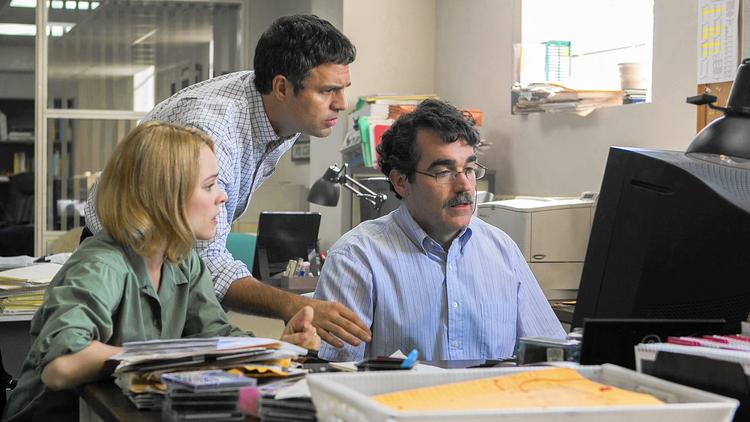"Spotlight" Is Reminder of News Media's Important Role
By Bill White
It's rare to see a movie in which reporters and their work are depicted in a realistic way. The most notable exception was "All the President's Men," although most of us don't look like Robert Redford. It offered a nice feel for a real newsroom and the kind of dogged digging that produces great stories The results were so momentous and the movie's portrayal of those events so compelling that they inspired a generation of journalists, not just to become reporters but to more vigorously embrace the role of a diligent press in a free society. I know I found it exhilarating. To that short list of uplifting but realistic depictions of journalists, we now can add "Spotlight," the Oscar Best Picture contender that dramatizes the Boston Globe investigation that exposed the horrible depth of child sexual abuse by Boston area priests and the massive cover-up perpetrated by Boston's religious, legal and government establishment. It's a great movie, and it's been gaining momentum throughout this awards season. But I had a special interest in it even before I knew how well it told this story. For one, I've written for years about child sexual abuse, its terrible aftermath and efforts to identify and punish the perpetrators and their protectors. The Morning Call's news staff covered the local story aggressively back in 2002 after the Boston scandal broke, persisting in the face of negative reactions from former Bishop Edward Cullen and others who labeled the newspaper anti-Catholic for reporting on the way the diocese handled abusive priests. The revelations about Boston sparked investigations and shocking revelations in archdioceses all over the country, including Philadelphia, where sexual abuse by priests and official cover-ups resulted in two damning grand jury reports and spurred efforts — unsuccessful, so far — to reform Pennsylvania's statute of limitations laws to help some long-ago victims finally name their tormentors and seek justice. Those bills always have been buried in committee and opposed by the church. I've been among those advocating for them, but I have no confidence that legislative leaders ever will let one of these bills come to the floor for a vote. A second reason I was particularly interested was that the Globe editor who encouraged and oversaw the investigation was Marty Baron, with whom I worked on Lehigh University's Brown and White newspaper when we were undergraduates in the '70s, something of a golden age for the student paper, in my not so humble opinion. He's now editor of the Washington Post and probably the most distinguished of Lehigh's journalism graduates. He's portrayed in the movie by Liev Schreiber. Baron will be back at Lehigh in a couple of weeks for a showing of "Spotlight" and a question-and-answer session. Finally, it resonates because it's a strong reminder of the potential that journalists still have to make a real difference, even in these times of constant staff cutbacks and shrinking coverage. The Globe and these reporters won a Pulitzer Prize for their reporting, which puts them in very rare company. And I can tell you that only a handful of newspapers these days could afford to devote several reporters to one investigative project for a week, let alone a year. But the significant resources devoted to this story are less important than the qualities that allowed it to come together. "Spotlight" draws real drama from the sometimes mundane work that goes into an investigative project. The reporters spend a lot of time huddling over old journals, digging through news clippings, skulking around courthouses, doing Internet searches and being rebuffed by potential sources. I can easily identify with the initial reluctance to pursue this very uncomfortable story in a city where the Catholic church held such power and the obstacles seemed so great — and with the reporters' and editors' growing sense of purpose and even outrage as they came to understand how monstrous the situation really was and became determined to get it out in the open. David Clohessy, national director of the Survivors Network for Those Abused by Priests, offered a quote from former President Calvin Coolidge to explain his then-mostly disrespected organization's determination to hang on until the Boston investigation suddenly vaulted SNAP into prominence. But it's an equally good fit for the reporters who finally managed to drag this reeking scandal into the sunlight. Coolidge said, "Nothing in this world can take the place of persistence. Talent will not: Nothing is more common than unsuccessful men with talent. Genius will not: Unrewarded genius is almost a proverb. Education will not: The world is full of educated derelicts. Persistence and determination alone are omnipotent." Needless to say, the Lehigh journalism class I teach will be assigned to attend that screening of "Spotlight" Feb. 18 at Lehigh's Baker Hall. I hope for at least a few of them, it has the same kind of impact that Watergate and "All the President's Men" had on me and so many others — a reminder that this much-maligned profession still has the potential to do enormous good. Contact: bill.white@mcall.com
|
.
Any original material on these pages is copyright © BishopAccountability.org 2004. Reproduce freely with attribution.
